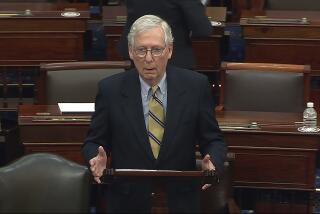Harsh Criticism of Tower Opponents Contrasts With Bush Response : Quayle Says Democrats Aim to ‘Undermine Presidency’
- Share via
WASHINGTON — Vice President Dan Quayle on Friday accused Democrats of using “McCarthyite mud-slinging” tactics against John Tower, the former defense secretary designee, as part of a deliberate campaign to “undermine the presidency.”
In language harsher than any Bush Administration officials had used before, Quayle charged that Democrats, having lost “five out of the last six presidential elections,” have decided the White House has become the “political base” of the GOP, and, thus, have decided to try to weaken executive power, running the risk of also weakening the nation.
Quayle’s remarks in a speech to a business group in his home state of Indiana reflect an emerging role for him as the Administration’s partisan point man, a counterweight to President Bush’s appeals for bipartisanship.
Bush Declines Comment
Bush, as has been his pattern, struck a conciliatory tone Friday, saying that the Tower debate “is over, that’s history” and that he expects to work well in the future with congressional Democrats. Asked about Quayle at the press conference called to announce Tower’s replacement, Bush declined to comment.
“Tomorrow it’ll be some other problem. And we will--I will work with the Congress,” Bush said.
White House aides, meanwhile, sought to distance Bush from Quayle’s attack on the Democrats. “There is some difference in tone” between Bush’s remarks and Quayle’s, said White House Press Secretary Marlin Fitzwater.
No members of the White House staff had reviewed the speech before Quayle delivered it, Fitzwater said, adding that Bush supports Quayle’s right to “speak out freely.”
Democrats Mirror Tone
Bush’s conciliatory tone was mirrored on the other side of the political divide in Philadelphia, where moderate and conservative Democrats convened for a meeting of the Democratic Leadership Council.
The meeting, devoted in large part to discussions of how the party could end its string of electoral defeats, was the forum for a series of speeches calling for success through bipartisan cooperation.
“We cannot prevail as a great power if either our enemies or our allies look to Washington and see division,” said Sen. Sam Nunn (D-Ga.), who chairs the Senate Armed Services Committee and also the Democratic group. “Our nation cannot afford a separate Democratic and Republican foreign policy.”
The contrasts between Quayle’s words and the tone set by Bush and Nunn display the wide range of emotional responses that the defeat of Tower’s nomination has evoked.
On one side, there is considerable anger shared by Quayle and at least some members of the Republican Senate minority.
“In all my years in the Senate, (I never have) encountered anything like the feeling of outrage that exists today among my former Republican Senate colleagues,” he said. “Never have I encountered such anger and bitterness in the Senate chamber.”
On the other hand, there is the view shared by Bush, who said that he takes “a rather broad perspective of how things are in Washington,” and Nunn, who declined to respond directly to Quayle’s charges and told reporters in Philadelphia, “I think it’s time to let emotions heal and let the scars begin to heal.”
Nunn offered to move ahead on an item that has been a high White House priority, saying that he wants to see Congress act soon on proposals to amend the War Powers Act to “move us closer to the goal of a bipartisan foreign policy.”
Officials of the last three administrations have argued that the act, written to give Congress a say in decisions to send troops abroad, infringes on presidential power.
Bush, meanwhile, conceded that he “may have made a mistake” in how he went about nominating Tower, a mistake that might have contributed to the nominee’s downfall. His decision to have the FBI look into all allegations against Tower before the nomination took time and “maybe set a tone . . . that encouraged, you know, leaks, counterleaks and investigation of rumor and innuendo,” Bush said. “So I’d have to accept some responsibility for that, I think.”
Staff writer Robert Shogan contributed to this story from Philadelphia.
More to Read
Get the L.A. Times Politics newsletter
Deeply reported insights into legislation, politics and policy from Sacramento, Washington and beyond. In your inbox twice per week.
You may occasionally receive promotional content from the Los Angeles Times.









